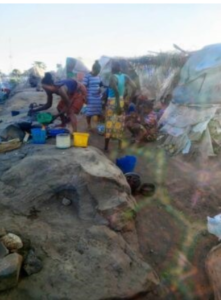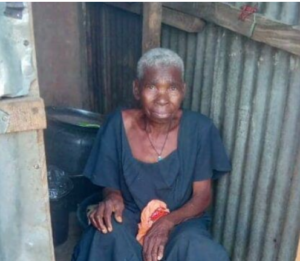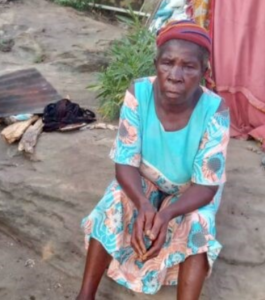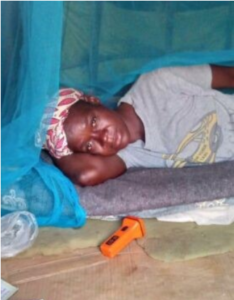Internally displaced persons (IDPs) at Ichwa Camp in Makurdi, Benue State, are grappling with the aftermath of banditry—having witnessed killings, lost family members, and property—and now find themselves in the throes of even greater difficulty. The removal of fuel subsidies has heightened economic challenges and worsened their living conditions. The state government’s failure to fulfill its promise of providing palliatives, despite a 5billion naira support fund pledged by the federal government, adds to the struggles of these IDPs. Safer-Media Initiative (SMI) reports the disheartening reality.
Akwacha Mary, a 47-year-old resident of Ajimaka village in Guma LGA, Benue State, along with her family, suffered an attack by suspected herdsmen last year, leading to their displacement from their home in Ajimaka and also claiming the life of her husband.
Prior to the upheaval, Mary’s family took pride in their two hectares of land, a source of sustenance through cultivation and crop planting. This piece of land had been the lifeline for both their immediate and extended family, providing the means to put food on the table. The devastating attack, however, disrupted not only their daily lives but also the once-vibrant source of their livelihood.
Now, life has taken a more challenging turn for her. Mary now earns a living by making brooms in the IDPs camps, but the little profit is overshadowed by market inflation. Affording food and medicines for herself and her family has become a struggle.
She has the responsibility of caring for her three children. But Mary now relies on the government and individuals to provide food for them in the camp. She told SMI that government supplies come only once every two or three months and barely last for two weeks.

Akwacha Mary, with other displaced women in Ichwa IDPs camp
“The government helps us with food, but it is never enough for everyone. With 2403 households, you can imagine how little each household gets. Usually, we receive a measure (mudu, as the IDPs call it) of rice, beans, and garri. This only lasts about a week, especially for those with many children,” explained Mary.
SMI gathered that the Ichwa IDP camp, with a total population of about 14315 and a household of 2403, depends on relief materials from the government, individuals, or humanitarian aid from organisations that visit the camp.
Gabriel Yev, is also one of those who was displaced by terrorists. He said the Camp typically gets 250 bags of 25kg rice, 250 bags of 25kg Beans, 100 bags of Garri, 17 gallons of 20liters of palm oil, 15 gallons of 20liters of vegetable oil.
“Even though these food items are distributed per household, it’s not meaningful because the maximum a household can receive is one mudu. Some households have up to five or six members or even more. For instance, in my family, I have six children: myself and my wife. Therefore, the items don’t suffice,” Yev explained.
Life has become more challenging for IDPs like Mary and Gabriel, given the limited assistance from the government. The removal of the fuel subsidy has added to their struggles, and they face continuous threats from bandit attacks, preventing any return to their villages. Despite these hardships, they still have to provide for themselves and their families.
Similar to SMI’s findings of a 50 percent rise in food prices, the camp residents said that they now purchase a mudu of rice for one thousand five hundred and beans for one thousand one hundred (N1500 and N1100). This marks a significant increase from the previous prices of eight hundred and five hundred Naira (N800 and N500), respectively.
On May 29, the new President, Bola Tinubu, declared in his inaugural address that his administration would be removing the fuel subsidy. The announcement immediately led to fuel queues as many retailers shut their filling stations, hoarding their stock and creating scarcity with a view to hiking fares later.
Two days later, the Nigeria National Petroleum Company Limited (NNPC Ltd) officially increased the pump price of gasoline by about 200 percent. The NNPCLtd, in a statement signed by its chief corporate communications officer, Garba Deen Muhammed, explained it was adjusting prices upward “in line with current market realities,” adding that “prices will continue to fluctuate to reflect market dynamics.”
The development has, however, led to a sharp rise in the cost of transportation on the different routes and unprecedented inflation of products across the country.
IDPs bear the brunt of the subsidy removal
Some IDPs who spoke with SMI said the effect of the subsidy removal on the economy has worsened their condition.
 Mary Yev, one of the victims of insecurity attacks in Benue state
Mary Yev, one of the victims of insecurity attacks in Benue state
When 75-year-old Mary Yev first heard about the fuel subsidy removal, she did not immediately grasp how it was going to affect her livelihood. It wasn’t until a week later that she learned a mudu of rice had surged by over 50 percent.
Having survived an attack by suspected Fulani militants in Tse Anwayo Geebe, Agan Council Ward, Makurdi LGA, Mary works as a miller in one of the milling factories near the IDPs. Her earnings, however, amount to less than a thousand naira in profit.
“I go to the rice mill to help the millers winnow their rice. Sometimes they reward me with a mudu or more, depending on the number of bags,” Mary explained.
She used to manage to get two mudu of rice to supplement with whatever assistance the government provided. In cases where no government aid arrived, she struggled to buy an extra mudu of rice and a mudu of beans.
Now, with prices soaring, Mary’s purchasing power has taken a hit, making it even more challenging for her to make ends meet.
Mary’s situation reflects the challenges faced by all the IDPs who spoke with SMI, revealing that they have not received any palliatives related to the fuel subsidy removal in the camp.
SMI’s investigation revealed that, for more than two months, the occupants of the camp have been deprived of government-provided food and have not benefited from the relief measures intended to ease the negative impact of the fuel subsidy removal.
State government received N2bn out of the N5bn of FG’s financial support
In one of its approaches to cushioning the impact of fuel subsidy removal, the federal government announced the disbursement of N5 billion to each state.
Despite the fact that the Benue state government has confirmed receiving N2 billion, IDPs and PWDs informed SMI that they have not seen any improved government intervention to cushion the effect of the subsidy.
This contradicts the promises made by Benue State Governor, Hyacinth Alia, who assured that the palliatives would be used to distribute substantial quantities of food items, such as rice, across all 23 local government areas in the state.
Furthermore, he promised that a part of the funds were intended to provide grants to 5,000 women in the state based on the revised social register of women cooperatives, among other initiatives.
‘No subsidy palliatives for poorer Nigerians in Benue’
Mercy Nyishember, the assistant women leader of the camp, told SMI that the state government has provided no palliatives to IDPs in the camp.
“I am aware of the fuel subsidy palliative, but here in the state, we were told that the government, instead of giving it to the people, used the money to buy about 100 buses to carry people at a lesser cost to ease the transportation cost.”
She added that some of the IDPs engage in street begging and re-winnowing of rice chaff to at least get a meal a day.
“It’s not easy for us to take care of ourselves and our families, and as such, some people engage in so many difficult means to meet their end, such as street begging, re-winnowing the rice chaff from the rice mills, etc.
IDPs are starving
Life in the Makurdi IDPs camp has been challenging in recent months. Many families are relying on government assistance for sustenance, and they eagerly anticipate the resolution of insecurity issues to return home and resume their agricultural activities.
 Mama Kwartakpa (as she is fondly called)
Mama Kwartakpa (as she is fondly called)
Sixty-five-year-old Kwartakpa Orke, who lost two of her children during one of the bandits’ attacks on her village, Tse-orke Anter mbalagh, Mbagwen Makurdi LGA, explained to SMI that she sometimes thinks of death as the only means of relief from the hardship she has been putting through.
“I came here because of the Fulani crisis that engulfed my community and brought me here. As a result of the attacks, two of my children were killed, leaving me alone here. It’s been a sober experience; at times, I feel like taking my life, but because everything is hard,.
“There is no means of livelihood apart from the government and well-wishers. The food the government gives us is not enough because, most times, we get only a mudu of whatever they bring, and they expect us to live on it for months.
This was the same story for Justina Sha from Umenger Village, Guma LGA, Benue.

Justina Sha
Justina, another displaced individual enduring the challenges of survival amidst the ongoing economic hardships
Until last year, when the gun-blazing bandits attacked her village, Justina and her four children lived with her husband, who catered for all her family’s needs and made sure they had food to eat three times daily.
However, on that ill-fated day, the terrorists attacked her village; her husband was not spared and was caught by a bullet. Since then, she has been at the IDPs camp with her three children.
“I go to the rice mill to help millers winnow their rice, and they give me the little rice they can at the end of the day. Even though we did receive help from the government a few months ago, it was not meaningful because of our large number.”
The Sick, PWDs face more hardship
 Dooorun Jato
Dooorun Jato
Dooorun Jato has been battling sickness since early this year but stopped going for medical check-ups as of August 2023 due to an inability to afford the associated bills.
Jato explained to SMI that she used to rely on well-wishers to take care of her medical bills, but it has been a while since she received any help from the non-governmental organisation.
Just as she explained to SMI, there are no public health centers in the camp for sick people who need medical attention. “There is no hospital in the camp. The government only promised to get one for us a few weeks ago, but they have not,” she said.
“If not for economic hardship, I would have gone for a checkup now, but I can’t do anything except have a visitor come in and decide to pay for my medication.”
Christiana Udoo Ordue, a person with a disability residing in the Ichwa IDP camp, has experienced hard times.
 Christiana Udoo Ordue
Christiana Udoo Ordue
75-year-old Christiana Udoo Ordue, already facing socio-economic challenges due to her blindness, finds herself in even more distress amid the current economic conditions.
As a result, Ordue has been forced to forgo essential medications or treatment due to financial constraints, worsening her health conditions.
“I survived the Fulani crisis twice. Being blind means a whole new life, where I have to rely entirely on sympathisers to get by.
“Now, everything is becoming tougher. The mudu of rice we used to buy for N700 is now N1500, and it is not like I am employed, so affording the increase is challenging.”
Good policy, poor implementation
Despite the government’s commitment to supporting internally displaced persons (IDPs), as outlined in the revised 2021 National Policy on IDPs, which emphasises medical care for the wounded, infirm, and those with disabilities, the actual implementation and fulfillment of these promises have fallen short. The policy, originally introduced in 2012 and reviewed in 2021, has not translated into effective support and services for the targeted individuals.
In 2021, the government signed a revised edition of the National Policy on IDPs. The policy states that all wounded, infirm, and IDPs with disabilities shall receive medical care to the extent practicable, which shall include psychological and social services whenever necessary. This policy was first introduced in 2012 before being reviewed last year.
State government shifts blame, fails to comment
On Monday, December 18, SMI, through this reporter, reached out to Charity Agber, the information officer of the Benue State Emergency Management Agency (SEMA), seeking SEMA’s response to its findings regarding the fuel subsidy palliative and the frequency of welfare package distribution to the Ichwa IDPs. Agber initially informed this reporter that she was no longer authorised to speak to the media.
When this reporter pushed further, she requested the questions be sent and assured that she would forward them to the relevant authority for a possible response. However, upon receiving the agency’s reply, it stated, ‘Anything palliative on fuel subsidy removal is under the jurisdiction of the governor and not from SEMA.’
Meanwhile, Agber failed to provide information about the regular welfare packages for the IDPs and how frequently the agency distributes them, even after additional inquiries from the reporter.
Similarly, SMI, through this reporter, reached out to the Chief Press Secretary to the Governor, Tersoo Kula, requesting to know why the state government has not distributed fuel subsidy palliatives to the IDPs and PWDs in Ichwa camp. He told the reporter that the issue bordering on humanitarian is manned by SEMA, and he has sent the question to them for debriefing.
This was despite this reporter having to wait for days to get his response, with consistent reminders through phone calls and SMS.
He also noted that they (SEMA officials) are the ones who have an idea of how they distribute the palliative and can respond appropriately to the issue.
This special report is produced by Safer-Media Initiative with the support of the Wole Soyinka Centre for Investigative Journalism (WSCIJ) under The Collaborative Media Engagement for Development, Inclusivity and Accountability Project (C-Media Project) funded by the MacArthur Foundation.




